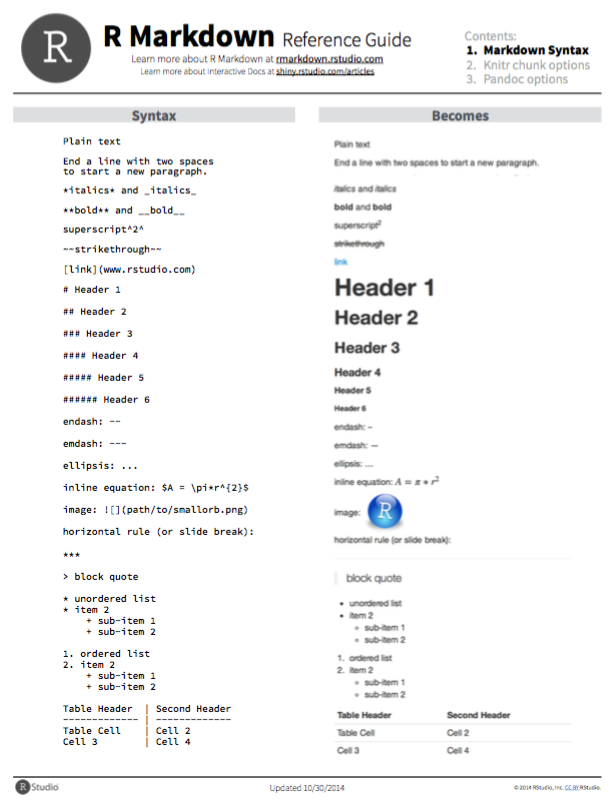F.5 Resources
This section provides pointers to additional resources related to R Markdown.
F.5.1 R Markdown documentation
R Markdown is being actively developed by RStudio. To keep track of changes, the site at https://rmarkdown.rstudio.com is a good starting point.
For more detailed instructions on R Markdown see:
Chapter 27: R Markdown of the r4ds textbook
R Markdown: The Definitive Guide (Xie, Allaire, & Grolemund, 2018)
The R package rmarkdown (Allaire et al., 2021) and its documentation
The R package knitr (Xie, 2022) and its documentation at http://yihui.name/knitr/ (Xie, 2015)
Useful practical resources on R Markdown include (in increasing amount of detail):
A Markdown Quick Reference card is available in RStudio via
Help > Markdown Quick Reference.The R Markdown Cheatsheet, available in RStudio via
Help > Cheatsheets > R Markdown Cheat Sheet.
- The R Markdown Reference Guide, available in RStudio via
Help > Cheatsheets > R Markdown Reference Guide (see Figure (fig:cheat-70-rmarkdown-reference)).

Figure F.2: R Markdown reference guide (from RStudio cheatsheets).
F.5.2 R Markdown for psychologists
Articles and theses in psychology typically need to conform to the manuscript guidelines of the American Psychological Association (aka. APA style), whereas other disciplines and journals have different needs and requirements. Many publishers now offer templates that allow authors to focus on content, rather than formatting.
Helpful resources for preparing journal articles in R Markdown include:
papaja is an R package for using R Markdown to write articles conforming to the APA manuscript guidelines (and works with the popular LaTeX document class apa6).
rticles is an R package that provides R Markdown templates for various journal articles and conference submissions.
chi-proc-rmd-template provides an ACM CHI Proceedings template in R Markdown.
pandoc journal templates provides templates for various journals in biometrics and statistics.
F.5.3 Miscellaneous links
CommonMark is a more strongly defined and compatible specification of the original Markdown (by John Gruber, in 2004) and provides an interactive tutorial for learning Markdown.
Project Jupyter is a related project that develops open-source software, open-standards, and services for interactive computing across many programming languages (including R). Jupyter Notebook is an open-source web application that you can try here or at rnotebook.io.
For background information on literate programming (Knuth, 1984), see
Donald Knuth on his book Literate Programming
Collection of quotes and sources
Wikipedia article on literate programming
For the related topic of reproducible research, see the CRAN Task View on Reproducible research.
RStudio facilitates a project-oriented workflow in many ways. The keyboard shortcuts for frequent commands in RStudio are shown via
Alt + Shift + Kor selecting Help > Keyboard Shortcuts Help.

[80_rmarkdown.Rmd updated on 2022-07-15 18:32:01 by hn.]